Finding the best online therapy that takes insurance shouldn’t feel like assembling a thousand-piece puzzle. Yet for many people, the process is still confusing.
A recent survey of more than 2,400 U.S. adults conducted by Grow Therapy found that only 64% feel at least somewhat confident choosing a health insurance plan that will meet their mental health needs. That includes just 31% who report feeling strongly confident. This suggests that millions of people enter open enrollment each year without a clear understanding of what their coverage actually includes.
Cost confusion is a major source of hesitation, leading to decreased confidence in choosing a health insurance plan. Nearly one-third (32%) of Americans say copays, deductibles, and out-of-pocket costs are the most confusing parts of selecting mental health coverage. This uncertainty can discourage people from starting therapy at all. In fact, 1 in 5 adults (20%) has delayed or avoided therapy because of insurance challenges.
That’s why finding online therapy platforms that accept insurance and are easy to navigate is so important — especially when you want to avoid unexpected costs while searching for the right provider. Below, we break down the best online therapy options for 2026 that accept insurance. We focus on how each handles insurance, what they offer, and how they compare.
Comparison: Best virtual therapy that takes insurance
| Payment model | Medication management | Digital tracking tools | |
|---|---|---|---|
| Grow Therapy | Pay-per-session | ✓ | ✓ (Progress monitoring, AI journal) |
| Teladoc Health | Pay-per-session | ✓ | ✓ (Mood and sleep trackers, activity plans) |
| Cerebral | Pay-per-session (subscription for out-of-pocket clients) | ✓ | ✓ (Progress tracking, journaling tools) |
| Thriveworks | Pay-per-session | ✓ | ✗ |
| MD Live | Pay-per-session | ✓ | ✓ (Mood tracking, journaling) |
| Brightside Health | Pay-per-session (subscription for out-of-pocket clients) | ✓ | ✓ (Progress monitoring, self-guided therapy content) |
| Amwell | Pay-per-session | ✓ | ✗ |
| Alma | Pay-per-session | ✓ | ✗ |
| Talkspace | Pay-per-session (subscription for out-of-pocket clients) | ✓ | ✗ |
1. Grow Therapy

Grow Therapy makes it simple to find online therapists who accept your insurance and check your costs up front. Prospective clients can quickly filter more than 25,000 psychiatric and mental-health providers nationwide by specialty, experience, language, identity, availability, and insurance. And 90% of patients find a provider who fits their unique needs.
Unlike subscription-based platforms, Grow Therapy uses an accessible pay-per-session model. This often results in lower long-term costs — especially for anyone using insurance — and means clients don’t get stuck with hidden fees or add-ons.
Grow Therapy also works with more than 100 insurance plans, including major commercial and government options in many states, making it easier to budget for and start therapy with confidence.
Cost and insurance:
- Cost with insurance: Most clients pay ~$21 per session; some pay as little as $0 (depending on plan)
- Typical out-of-pocket range: $75-$250+ per session (pay-per-session, no subscription fees)
- Accepted insurance: 100+, including Aetna, Cigna, UnitedHealthcare, Medicaid, and Medicare (availability varies by state)
Key features:
- Robust search and filtering tools to find the right provider (e.g., by speciality, language, insurance, etc.) for identity-affirming care, trauma, ADHD, anxiety, and more
- Searchable directory for low-stress scheduling with real-time availability
- Transparent per-session pricing
- In-network cost estimates before booking
- Progress monitoring tools
- Medication management (psychiatry and NP providers)
- Optional AI-powered private therapy journal
Who it’s a good fit for:
Grow Therapy is ideal if you’re looking for ongoing, relationship-based therapy rather than brief consults or text-only support. The platform is designed for that kind of continuity, with transparent cost estimates and coordinated care. Plus, many patients see improvements after just a few sessions.
| Pros | Cons |
|---|---|
| • Broad insurance acceptance | • Out-of-pocket pricing varies by provider |
| • Large, diverse provider network with filters for personalized matching | • In-person availability depends on region |
| • Therapy, psychiatry, and medication management in one place |
2. Teladoc Health
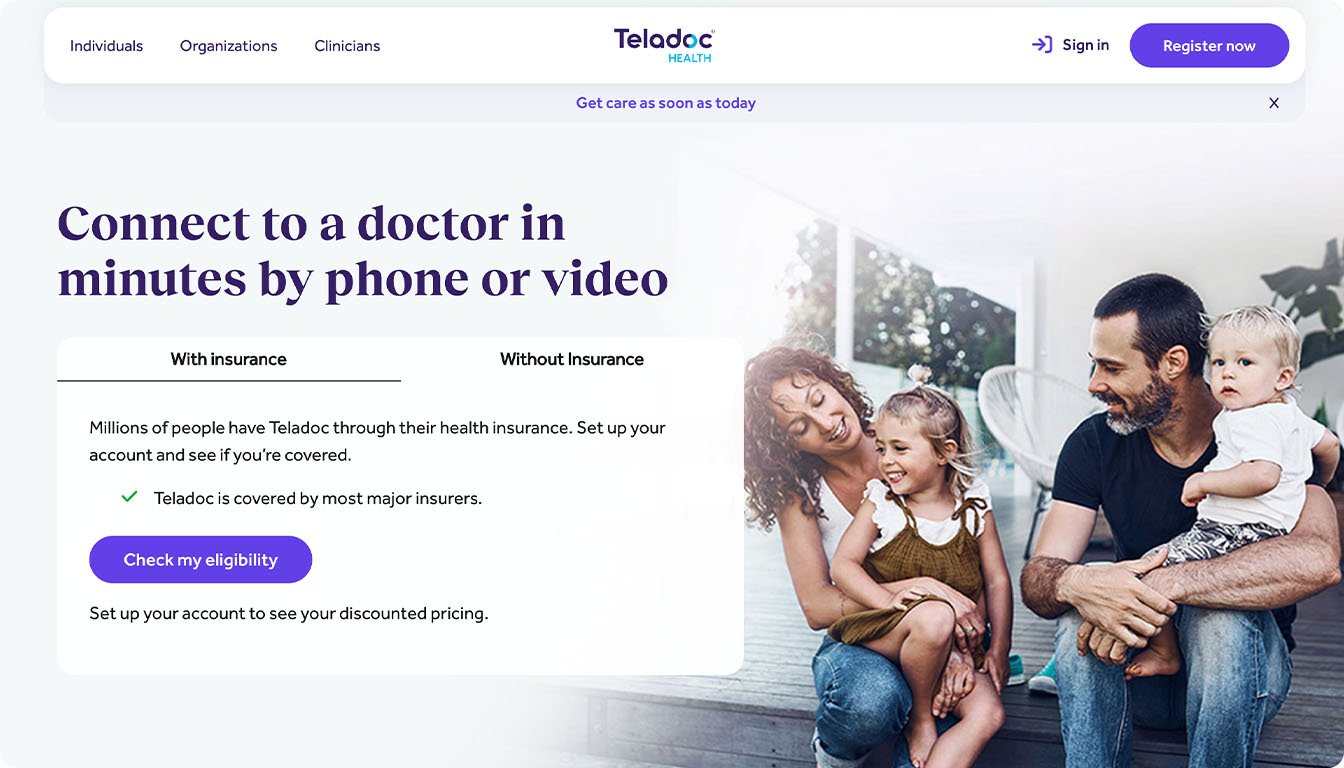
Teladoc Health is a well-known telemedicine platform offering virtual visits with a variety of providers, including mental health clinicians and psychiatrists.
As one of the most prominent employer-supported platforms in the U.S., Teladoc often enables users to access therapy sessions that are either discounted or fully covered. The platform offers comprehensive care across specialties like primary care, dermatology, and nutrition counseling, with broad insurance coverage and support for consistent follow-up.
Cost and insurance:
- Cost with insurance: $0-$119 per session
- Typical out-of-pocket range: $119 per session
- Accepted insurance: Broad acceptance across employer-sponsored plans
Key features:
- Video visits with therapists and psychiatrists
- General medical telehealth available on the same platform
- Digital tools and resources
- Extensive provider network
Who it’s a good fit for:
Teladoc is a good fit for short-term counseling, medication consultations, or ongoing medication management.
Prospective patients should be aware of the fact that Teladoc takes a clinical, medical-first approach. It may not offer long-term therapy matching, making it less ideal for those seeking extended, relationship-based care.
| Pros | Cons |
|---|---|
| • Employer sponsored plans | • Less focus on long-term therapeutic relationships |
| • Easy to book quick appointments | • No digital progress tools |
| • Interactive tools for extra support | • Navigation can feel “medical” versus mental health-specific |
| • Flexible availability |
3. Cerebral
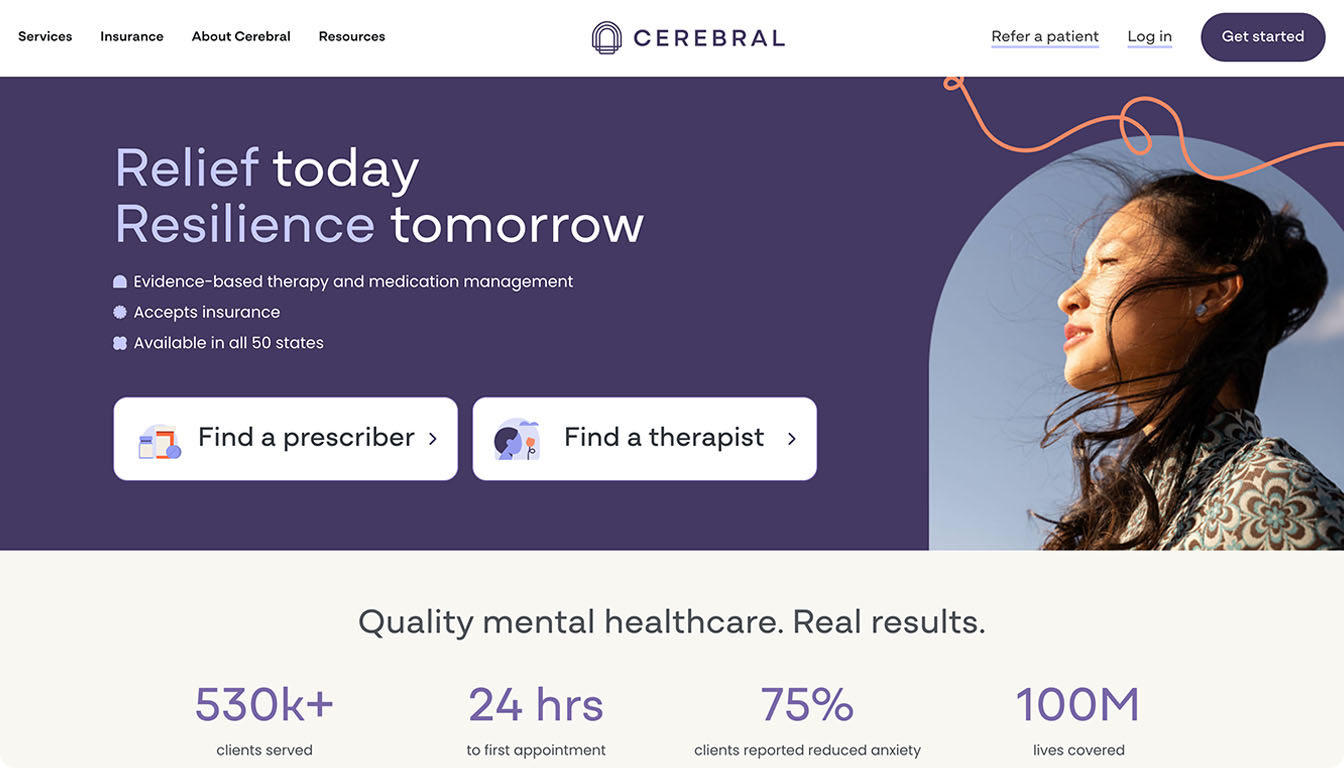
Cerebral is an online mental health service that’s pay-per-session if you’re using insurance. The tool offers therapy, coaching, and medication management, with programs centered on anxiety, depression, and ADHD. It provides structured care plans, frequent check-ins, and optional progress-tracking tools for people who prefer a more guided experience rather than open-ended talk therapy.
While it accepts several large insurers, participation varies significantly by state.
Cost and insurance:
- Cost with insurance: Average $30 copay per session
- Typical out-of-pocket range: $175-$250 per session (intake sessions cost more)
- Accepted insurance: Some insurance accepted (Aetna, Cigna, BCBS, Optum, UHC), but varies by state; may require copay or coinsurance
Key features:
- Medication management
- Weekly or monthly virtual therapy (plan-dependent)
- Evidence-based approach
- Regular progress check-ins
- App-based tracking
Who it’s a good fit for:
Cerebral is a good fit if you want convenient, ongoing online support for issues like anxiety, depression, and insomnia. You’ll also need to be comfortable meeting with your provider by video instead of in person.
It offers therapy and medication management in the same place. However, there are no in-person care options available. Additionally, controlled-substance prescriptions are restricted and appointment availability varies across regions. If you feel like a virtual session won’t fit with your preferences, you might want to seek out other options.
| Pros | Cons |
|---|---|
| • Frequent communication | • Not as customizable for patients as provider and partner networks like Grow Therapy |
| • Good for anxiety and depression treatment | • Limited insurer participation |
| • No true in-person care options available | |
| • Controlled substances may not be available | |
| • Varies significantly by location |
4. Thriveworks
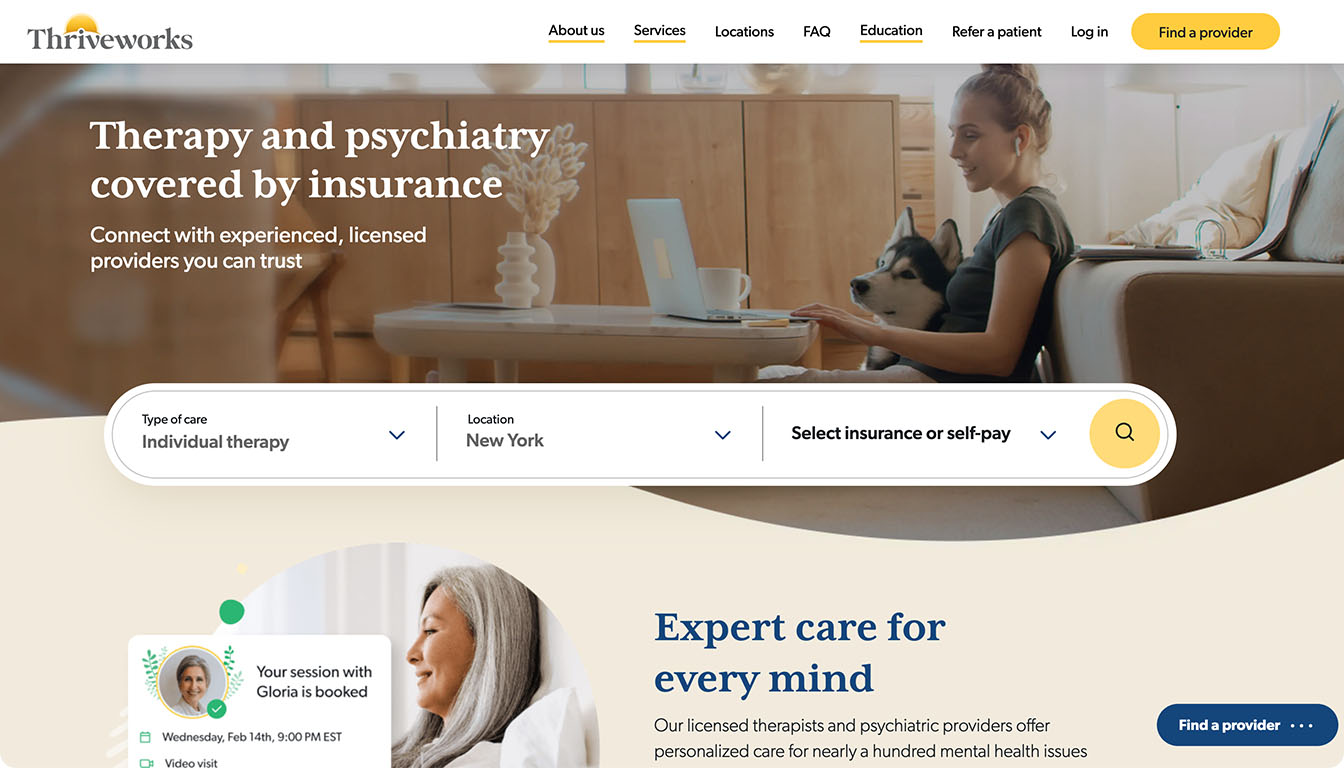
Thriveworks offers online therapy across many U.S. cities, functioning like a nationwide therapy clinic rather than a subscription-based app.
With broad insurance participation among major commercial plans and EAPs, clients can typically access care within a reasonable wait time. Thriveworks also covers a wide range of specialties, including couples counseling, trauma therapy, teen therapy, and LGBTQIA+ care.
Cost and insurance:
- Cost with insurance: ~$0-$55 per session in copays
- Typical out-of-pocket range: $200-$240 for initial psychotherapy sessions and $160-$195 for follow-ups; Psychiatry intake sessions range from $300-$375 with follow-ups from $210-$300
- Accepted insurance: Accepts many major insurance providers and EAP programs
Key features:
- Therapy, psychiatry, and coaching
- Video-based evaluations
- Specialized therapy for couples, teens, and LGBTQIA+ patients
- Integrated psychiatry and medication management in many states
Who it’s a good fit for:
Thriveworks is a good fit for those seeking flexible online therapy with strong insurance coverage.
However, the experience can vary by location. Not all areas offer psychiatric services, and pricing may be higher than on other online platforms. Provider search tools are also less robust than tech-first directories, making Thriveworks better suited for those who prioritize local clinic access over advanced filtering features.
| Pros | Cons |
|---|---|
| • Great for people who want online and in-person flexibility | • Pricing can be higher than other platforms |
| • Broad range of specialties | • Availability depends heavily on location |
| • Insurance-friendly | • Not all providers offer medication management |
| • Fewer provider search tools |
5. MD Live
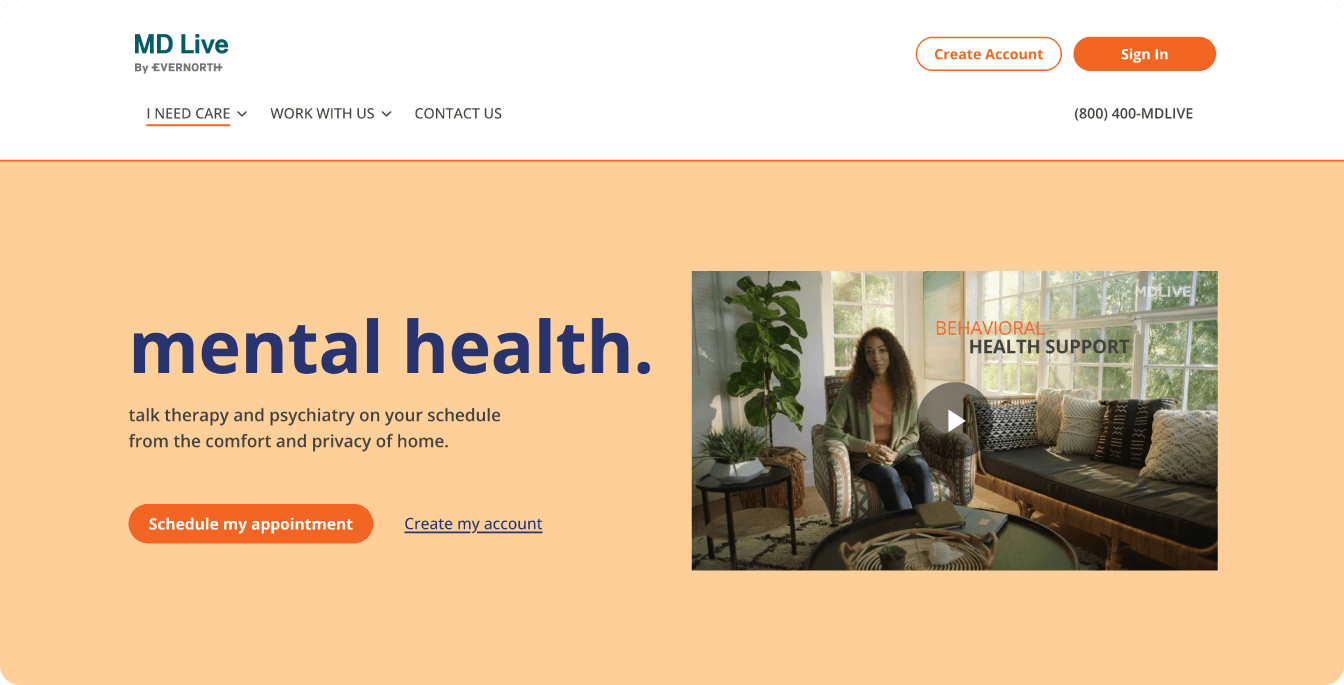
MD Live is a large telehealth platform offering therapy and psychiatry alongside urgent care and medical visits. It accepts many major insurance plans and some Medicaid and Medicare options, helping keep session costs aligned with typical copays.
Mental health appointments are generally easy to book, and the platform supports care for adults, teens, and older children — making it useful for families who want everything in one place.
Cost and insurance:
- Cost with insurance: $0-$179
- Typical out-of-pocket range: $179 for initial sessions and $140 for follow-ups
- Accepted insurance: Accepts many major insurance providers, including Medicaid and Medicare in some states
Key features:
- 24/7 general medical care on the same platform
- Care available for children and teens ages 10-17
- Mobile-first platform
Who it’s a good fit for:
MD Live works well for straightforward therapy needs or one-off sessions, particularly for families seeking quick-access care across multiple health services.
Interested patients should note that it’s geared toward convenience rather than deeply personalized therapy. The tool has limited provider filtering and doesn’t have long-term tracking tools or measurement-based support. This can make it less ideal for ongoing relationship-based care.
| Pros | Cons |
|---|---|
| • Wide insurance acceptance | • Limited specialization filtering |
| • Same-week scheduling | • No long-term progress tools |
| • No membership fees | • No measurement-based tracking |
| • Good for one-off sessions |
6. Brightside Health
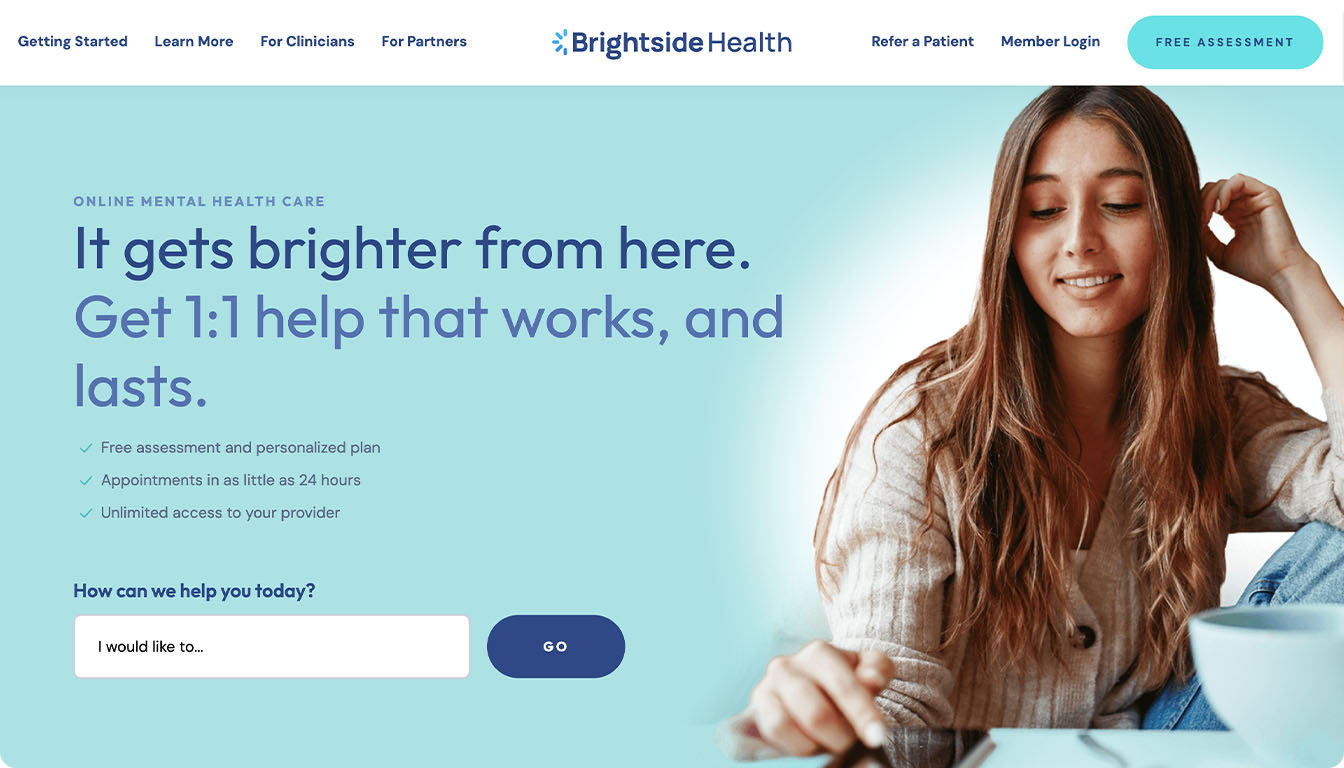
Brightside Health specializes in evidence-based treatment for anxiety, depression, and related conditions, with integrated therapy and psychiatric care. It uses a pay-per-session model if you’re using insurance, with structured weekly check-ins, measurement-based adjustments, and ongoing symptom-tracking dashboards.
The platform also provides self-guided CBT-inspired content and a crisis-prevention pathway for high-risk patients. And people needing a higher level of care than weekly individual therapy can inquire about virtual intensive outpatient programs (IOPs) for more targeted support. But insurance acceptance is narrower than some competitors, particularly for therapy-only plans.
Cost and insurance:
- Cost with insurance: Average copay $25 per session
- Typical out-of-pocket range: $299 per month for four sessions; $59 per session for additional appointments
- Accepted insurance: Accepts many major insurance providers, including Medicaid and Medicare in some states
Key features:
- Coordination of therapy, psychiatry, and medication management
- Measurement-based care and symptom tracking
- Suicide prevention program
- Digital progress tracking
Who it’s a good fit for:
Brightside better fits the needs of prospective patients seeking structured, evidence-based care with regular monitoring and integrated medication management.
It might be less of a good fit for individuals wanting long-term relationship-based talk therapy. The subscription structure can feel rigid, medication availability varies by state, and those with broader insurance needs may find fewer in-network options.
| Pros | Cons |
|---|---|
| • Highly structured treatment plans | • Limited insurance acceptance |
| • Strong focus on anxiety and depression | • Subscription may not fit everyone’s needs |
| • Weekly check-ins for ongoing adjustments |
7. Amwell
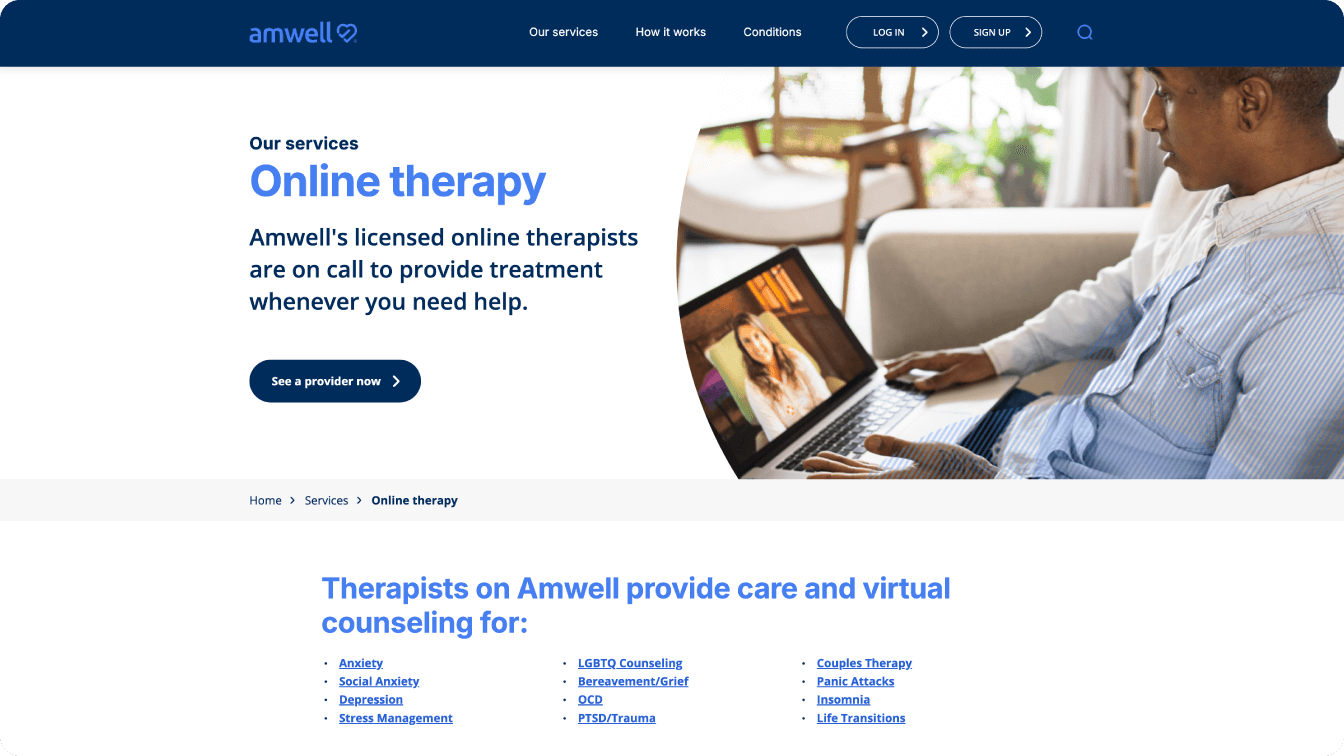
Amwell is a national telemedicine tool offering virtual therapy and psychiatry as part of its wider medical network. It provides evening and weekend availability, some self-guided mental health content through the SilverCloud platform, and access to both therapists and prescribing clinicians.
While many users pay standard copays, insurance acceptance varies considerably by state and plan, so exact costs may not be clear until scheduling.
Cost and insurance:
- Cost with insurance: $0-$99, depending on copay and coinsurance
- Typical out-of-pocket range: $99 or less per appointment
- Accepted insurance: Wide range of major health insurers, including Aetna, Anthem/Blue Cross Blue Shield, UnitedHealthcare, Cigna, and Medicare; coverage varies by state
Key features:
- Therapy and psychiatry
- Some self-guided mental health resources
- Nighttime and weekend availability
- Integrated platform for other medical visits
- Prescription management (varies by state)
- Short-term and episodic care focus
Who it’s a good fit for:
Amwell might suit those seeking occasional visits or clinical-style psychiatric care with flexible scheduling.
It’s less suited for those wanting long-term therapeutic relationships or detailed provider comparison, since browsing and filtering options are limited. The experience is closer to a medical appointment than an ongoing therapy model.
| Pros | Cons |
|---|---|
| • Wide range of telehealth services | • Harder to compare provider options |
| • Psychiatry available | • Insurance coverage varies more than others |
| • Suitable for one-off sessions | • Not ideal for long-term therapy |
| • Many insurers accepted in certain states | • Experience feels more clinical than therapeutic |
| • Fewer specialty therapy options |
8. Alma
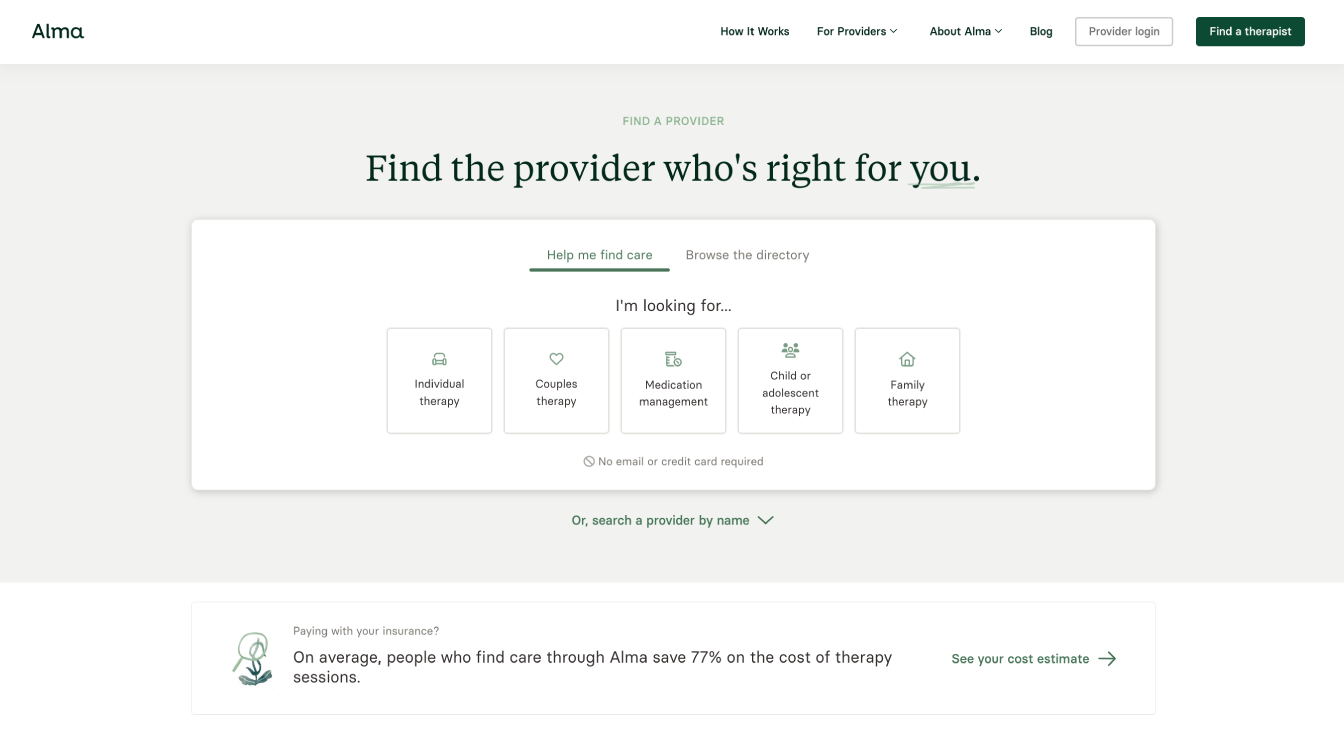
Alma is a membership platform that supports independent therapists by helping them manage billing, insurance contracting, and administrative tasks.
Clients browse a curated, user-friendly directory of mental health professionals with diverse specialties and book directly with each provider. This makes the experience feel closer to finding a private-practice therapist than using a centralized teletherapy app. Some Alma-affiliated clinicians accept major commercial insurance plans, though acceptance varies heavily by provider.
Cost and insurance:
- Cost with insurance: Depends on the individual clinician
- Typical out-of-pocket range: ~$130-$380 per session for most providers
- Accepted insurance: Limited; varies by provider
Key features:
- National therapist directory
- Mix of insurance and private-pay clinicians
- Some providers offer psychiatry or med-management partnerships
- Detailed provider profiles
- Direct scheduling with individual practices
Who it’s a good fit for:
Alma works well for those seeking a personalized, private-practice feel with access to diverse specialties.
It may not be a good fit for those wanting guaranteed insurance acceptance or unified pricing. Each clinician sets their own rates, session structure, and availability, with many remaining out-of-network.
| Pros | Cons |
|---|---|
| • Wide range of specialties | • Insurance acceptance varies |
| • User-friendly provider browsing | • No unified cost or billing structure |
| • Option to see clinicians in-network | • Less consistency than platform-based models |
| • No subscription fees | • No built-in progress tracking tools |
9. Talkspace
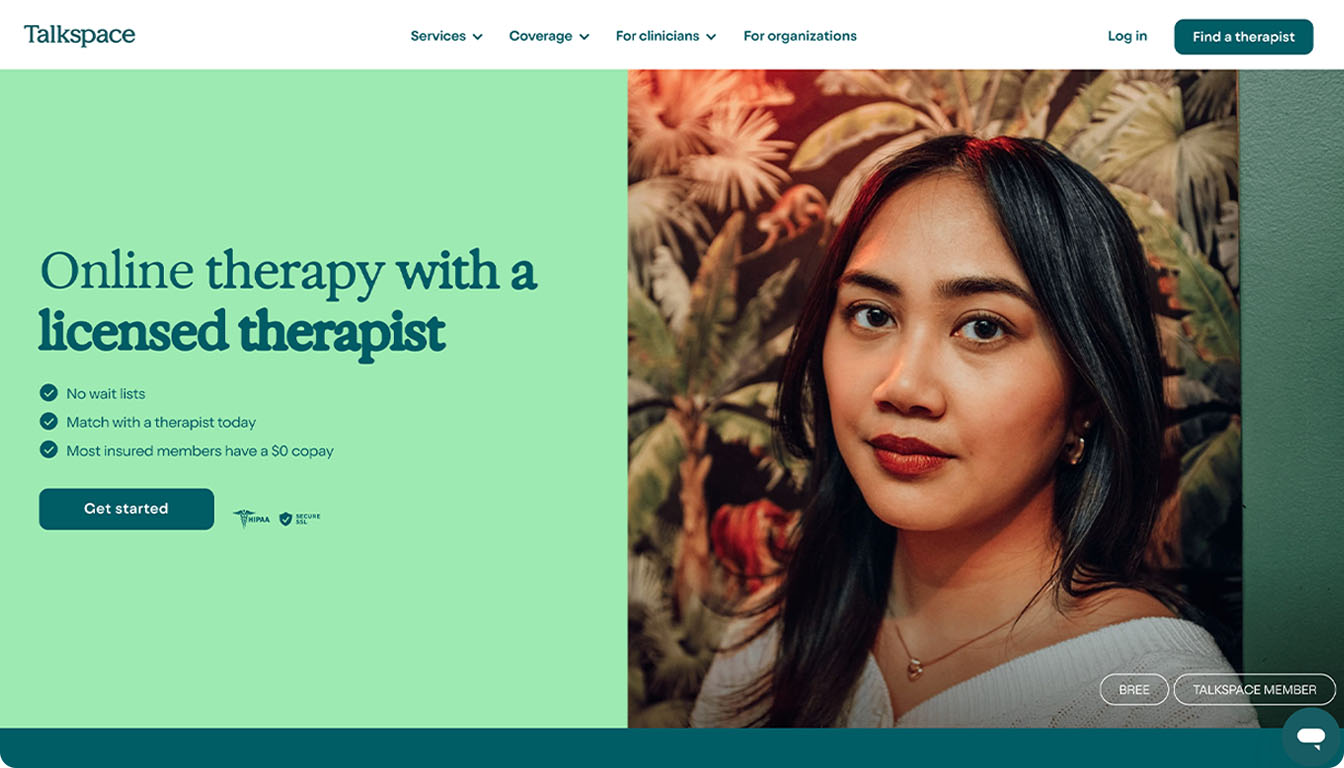
Talkspace provides online therapy through messaging, live video, or a combination of both. If you’re using insurance, Talkspace has a pay-per-session model that may cover the cost of care, depending on your plan or employer. Otherwise, out-of-pocket patients pay a subscription fee for therapy.
The platform is designed for flexible communication — daily messaging, quick check-ins, and optional live sessions — which can benefit people who prefer between-session support. However, coverage varies widely, and users may still pay subscription fees if their plan does not fully cover the service.
Cost and insurance:
- Cost with insurance: Copay or coinsurance when in-network
- Typical out-of-pocket range: $292-$460 per month (lowest plan only covers messaging therapy)
- Accepted insurance: Accepts many major insurance providers and EAP programs
Key features:
- Video-based evaluations
- Specialized therapy for couples, teens, and LGBTQIA+ patients
- Messaging therapy options
- Live video add-on options
Who it’s a good fit for:
Talkspace is a good fit for those seeking flexible, messaging-based support with occasional live sessions.
If you want consistent weekly sessions with the same therapist, Talkspace might not be a good fit. Provider availability varies, and the messaging-first model can feel impersonal for those who prefer traditional talk therapy.
| Pros | Cons |
|---|---|
| • Broad insurance coverage | • Some providers have limited availability |
| • Full ecosystem of therapy and psychiatry | • Pricing and services vary widely by plan |
| • Flexible communication styles | • Messaging format may not fit everyone |
| • Easy for quick questions between sessions |
How to find a therapist covered by insurance
Finding an in-network therapist is easier when you know what to look for. Here are quick steps to guide you:
- Check your insurance portal to confirm behavioral health benefits.
- Search for providers who list your exact plan, not just your insurer.
- Use platforms with built-in insurance filters (like Grow Therapy) that verify coverage for you.
- Estimate costs ahead of time, including copays, deductibles, and coinsurance.
- Look for clinicians offering the type of care you want, such as CBT, trauma-informed therapy, or ADHD treatment.
This helps you avoid surprise bills and find a provider who feels like the right match.
Discover online mental health providers in your network
Choosing online therapy covered by insurance can open doors to high-quality care without overwhelming costs. Whether you want ongoing weekly therapy or help navigating your benefits, Grow Therapy makes the provider selection process easy to start.
Take the first step to improve your mental health and find a therapist who takes your insurance and meets your needs. You can also estimate the cost of treatment to ensure that you’re finding accessible therapy within your budget.
